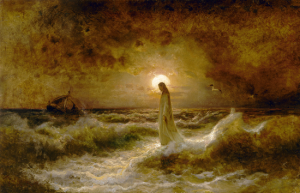John 6.15-21

In these six verses we see two examples of being in the presence of God. The first is Jesus who went up the mountain to pray and the second is when Jesus met the disciples in the stormy sea.
Jesus did not miss out on spending time in prayer and fellowship with his Father. At the beginning of the chapter Jesus had crossed to the east side of the Sea of Galilee with his disciples to find time to pray. This had been interrupted by a huge crowd seeking him and he then spent an exhausting day teaching, healing and finally feeding the crowd. He then withdrew on his own. His disciples had lost track of him. He went back up the mountain and stayed alone except for being in the presence of God through the evening and on into the night. This was not a one off, there are frequent references to Jesus spending time like this with his disciples and alone. At times he behaved in this way before a major event, prior to choosing his twelve disciples, Luke 6.12 before Peter’s profession of faith Luke 9.18 and before the transfiguration. Luke 9.28 Perhaps the times of greatest significance and recorded in the most detail were following his baptism Matthew 4.1-11 and on the eve of his crucifixion. Matthew 26.36-46 However, Jesus did not leave times of sustained prayer to times of greatest need, prayer to him was a necessity of life not to be postponed. Luke tells us that Jesus, ‘often withdrew to lonely places and prayed.’ Like 5.16 Jesus provides the ultimate example of choosing to spend time in the presence of God. He also needed those times to be uninterrupted and so found places where he could be quiet. It was to him as great a need as food, drink and sleep. Jesus did not let the business and urgency of the day crowd out quiet time. He normally chose to rise earlier or spend time at the end of the day to be with his Father.
The disciples having lost Jesus made the decision to row the six miles back across the Sea of Galilee even though it was going to take them well into the night to achieve it. Over half way across they hit trouble with high waves and strong winds. They were not fools, some were experienced sailors on the Galilean Sea, they knew they were at serious risk. At that point Jesus came alongside walking on the turbulent sea. Now they were more afraid from seeing Jesus walking on the water than they were of the stormy sea.
The importance of this event is not that this was simply an amazing feat, it lies much more in what it says about the identity of Jesus and the significance of the words Jesus spoke. Jesus in walking on the sea demonstrates that he is the Lord of all the natural world because he is the creator and sustainer of the world and beyond that the universe. When we are in his presence, this is who he is. How does that relate to the troubles we find ourselves in? Jesus reassures his disciples with the words, ‘It is I; don’t be afraid.’ John 6.20 This was not a carelessly chosen phrase. Jesus deliberately chose to say ‘It is I’ to remind them of Exodus 3.14 where God said to Moses when the people ask you who sent you, say to them ‘I AM has sent me to you.’ When Jesus said these words to the disciples he was preparing them for the time when he answered Jewish leaders with the words, ‘Truly, truly, I say to you, before Abraham was, I am.’
The impact of Jesus’ presence was that the disciples calmed down and welcomed him into the boat and they immediately reached their destination. John 6.21
What kind of King is this, the great ‘I AM’? “He is far greater than we can imagine, and his claim upon our lives is more significant than our tendency to domesticate God so often allows.” Josh Moody, John 1-12 For You
Do we make time and space within each day as Jesus did for spending that valuable time in the presence of God?
Do we allow the storms of our lives to triumph over the scale of the majesty of Jesus?
Here In Your Presence – New Life Worship
————————————–
